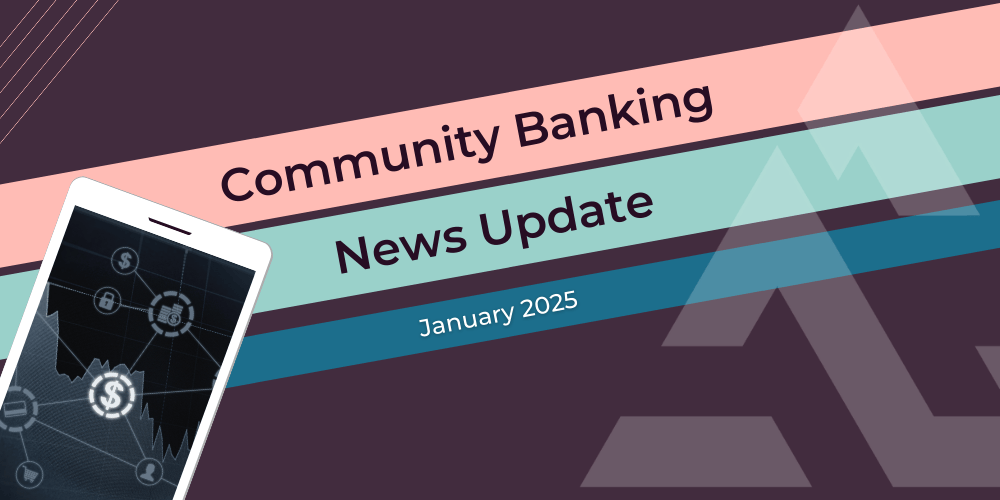This month's major stories in community banking and their impact 📣
Happy new year! Welcome to the latest edition of Community Banking News Update, your monthly roundup of the top news that affects community banks and credit unions and why they matter. Read last month’s issue here.
Our coverage kicks off 2025 with the resignation of the Fed’s Banking Supervision Chief Michael Barr, the overdraft fees cap, a planned lawsuit over bank stress tests, Federal Reserve rate cuts, CFPB suit over Zelle fraud, and record profits for big banks. What do all these developments mean for community financial institutions? Read on to find out.
1. Fed’s Banking Supervision Chief Michael Barr to Step Down
Michael Barr, the Federal Reserve’s Vice Chair for Supervision, has announced his resignation, effective at the end of January 2025. His decision comes as a Republican-led Congress and President-elect Donald Trump’s administration prepare to assume power, signaling potential shifts in the regulatory environment. Barr, who played a central role in implementing and enforcing stricter financial regulations following recent banking crises, is stepping down to avoid a contentious clash with the incoming administration, which has been critical of what it views as excessive regulatory measures. Barr's departure is expected to pave the way for less stringent supervision under the new administration.
Why This Matters to Community Banks and Credit Unions
Barr’s resignation could signal a possible shift toward lighter-touch regulation and reduced compliance burdens and associated costs. However, a more lenient regulatory environment may also increase the risk of bad actors exploiting the system, making it critical for community financial institutions to maintain robust anti-money laundering (AML) models and oversight practices.
Staying vigilant on compliance not only protects the institution's health but also helps sustain trust among customers and regulators. By proactively reinforcing their risk management frameworks, community banks and credit unions can safeguard their operations and continue to serve as trusted, stable partners in their communities.
For more on staying compliant with your correspondent banking relationship, read the blog from our Co-Founder and Chief AML Officer Sarah Beth Felix:
2. CFPB Caps Overdraft Fees at $5
The Consumer Financial Protection Bureau (CFPB) has finalized a new rule capping overdraft fees at $5 per occurrence, a significant reduction from the previous industry standard of $30-$35. The rule also mandates increased transparency, requiring banks to provide real-time notifications for low balances and clearer options to avoid overdrafts. CFPB Director Rohit Chopra has emphasized that the changes aim to protect consumers from excessive fees while ensuring fair practices in the financial industry.
The move has drawn criticism from banking trade groups, such as the American Bankers Association (ABA) and Consumer Bankers Association (CBA), which argue that the cap could limit banks' ability to offer overdraft protection and may lead to increased fees in other areas to compensate for lost revenue. Despite opposition, the CFPB is pushing forward, and the rule is set to take effect in October.
Why This Matters to Community Banks and Credit Unions
For community banks and credit unions, the $5 overdraft fee cap will alter a traditional source of non-interest income. Institutions that rely heavily on overdraft fees to fund operations may need to reevaluate their pricing structures and service offerings. This regulatory shift underscores the need to diversify revenue streams, such as leveraging international payments or non-interest income solutions, to adapt to an evolving financial landscape. Institutions that proactively address these changes will be better positioned to succeed in a post-overdraft-fee era.
Don’t think your clients are sending international payments? Think again:
3. Big Banks to Sue Federal Reserve Over Stress Tests
Several major U.S. banks are reportedly planning to sue the Federal Reserve over what they claim are unfair and overly stringent annual stress tests. These tests, which evaluate a bank’s ability to withstand economic downturns, have been a regulatory cornerstone since the 2008 financial crisis. The banks argue that the tests use outdated models and fail to account for recent risk management improvements, leading to disproportionate capital requirements that hinder their ability to lend and compete globally. This legal challenge could set a precedent for how the Fed oversees the financial industry and applies stress testing frameworks.
The lawsuit is expected to focus on allegations that the Fed’s methodology is opaque, inconsistent, and punitive. The banks assert that these flaws are forcing them to maintain excessively high capital reserves, reducing their profitability and growth opportunities.
Why This Matters to Community Banks and Credit Unions
Although stress tests are designed for larger banks, any changes to the Federal Reserve’s oversight framework could have ripple effects for community banks and credit unions. If the lawsuit leads to a shift in how regulators assess risk, it might result in broader adjustments to capital requirements or risk models that could eventually impact smaller institutions. Community banks and credit unions should closely monitor the outcome, as it may influence the regulatory environment they operate in.
4. Federal Reserve Cuts Interest Rates Again, But Signals Fewer Cuts Ahead
The Federal Reserve has reduced interest rates by another quarter point, bringing the federal funds rate to a range of between 4.25% - 4.5%. While the move aligns with the Fed’s strategy to support economic growth amid easing inflation and a cooling labor market, the central bank’s updated forecast indicates fewer rate cuts in 2025 than previously anticipated. This tempered outlook has unsettled financial markets, with stocks falling as investors adjust expectations for a slower pace of monetary easing.
The Fed’s decision reflects a balancing act between fostering economic stability and ensuring inflation remains under control. While lower rates typically benefit borrowers, the announcement of a cautious approach to further cuts signals that the central bank remains vigilant about potential risks in the economy.
Why This Matters to Community Banks and Credit Unions
The Fed’s rate cut and revised outlook present a mixed picture for community banks and credit unions. On one hand, the lower rates could stimulate borrowing activity, particularly among small businesses and local customers, offering an opportunity to expand lending portfolios. On the other hand, the signal of fewer cuts in 2025 may dampen longer-term loan demand and compress net interest margins, requiring institutions to carefully manage their balance sheets. This environment underscores the importance of maintaining diversified revenue streams and non-interest income.
Read our article on how to tap into new sources of non-interest income:
5. CFPB Sues Top U.S. Banks Over Fraud on Zelle Payment Platform
The Consumer Financial Protection Bureau (CFPB) has filed a lawsuit against JPMorgan Chase, Bank of America, and Wells Fargo, alleging they failed to protect customers from fraud on the Zelle payment platform. According to the lawsuit, the banks neglected to implement sufficient safeguards, allowing fraudulent transactions to proliferate and leaving consumers without adequate recourse. The CFPB claims this violated consumer protection laws, as customers were often unable to recover funds lost to scams.
The lawsuit could have broad implications for peer-to-peer payment platforms, as it highlights growing concerns about fraud and the responsibilities of financial institutions in mitigating risks. The banks, which co-own Zelle, have denied wrongdoing, stating they adhere to all regulatory requirements and have taken steps to educate consumers about potential scams.
Why This Matters to Community Banks and Credit Unions
The CFPB’s lawsuit puts a spotlight on fraud prevention and liability in digital payments, an area that community banks and credit unions must carefully navigate. As smaller institutions increasingly adopt or integrate peer-to-peer payment platforms, they must ensure robust fraud prevention measures are in place to protect their customers and avoid potential regulatory scrutiny. This case serves as a reminder that inadequate safeguards can lead to both reputational damage and legal challenges.
6. U.S. Banking Giants Report Record Profit Dominance
And yet, the four largest U.S. banks — JPMorgan Chase, Bank of America, Citigroup, and Wells Fargo — reported combined profits of approximately $88 billion during the first nine months of 2024. This accounts for 44% of the banking industry's total profits, marking the largest share of industry profits these institutions have captured since 2015. Analysts attribute their growing dominance to economies of scale, diversified revenue streams, and their ability to adapt quickly to changing economic conditions, such as rising interest rates and increased demand for digital banking services.
The continued profit growth of these banking giants highlights their ability to leverage size and market position to outperform smaller competitors. However, it also raises questions about the competitive landscape and the challenges faced by regional and community banks in maintaining relevance.
Why This Matters to Community Banks and Credit Unions
The growing dominance of large banks poses significant challenges for community banks and credit unions, particularly in competing for deposits, loans, and digital banking adoption. These smaller institutions often lack the scale and resources to match the offerings of larger competitors, making it critical to focus on their unique strengths, such as personalized customer service, local market expertise, and community engagement. Community financial institutions must proactively seek out strategic partnerships and innovative revenue streams to remain competitive and differentiate themselves in an increasingly consolidated market.
Acceleron builds patented software that allows community banks and credit unions to conduct international payment transactions profitably through a correspondent banking marketplace. Serving over 200 financial institutions and facilitating more than $1 billion in international payments annually, Acceleron helps small banks generate non-interest income and compete more effectively with high-fee big banks. Our solutions integrate seamlessly with top payments platforms, ensuring quick implementation and smooth operation.
Subscribe to our monthly newsletter to stay ahead of the curve and get original content you won't find anywhere else!
 Daisy Lin, Head of Marketing, Acceleron
Daisy Lin, Head of Marketing, Acceleron






